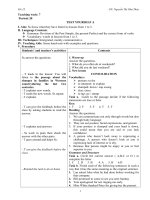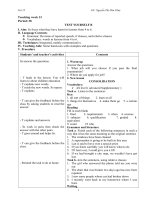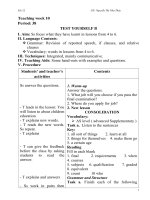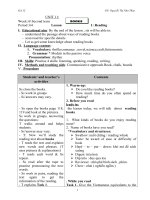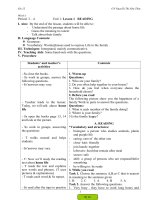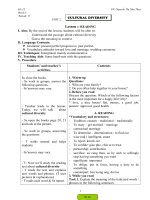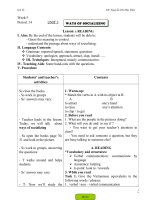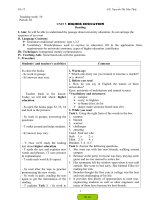TEST YOURSELF b UNIT 7 GIÁO ÁN MÔN TIẾNG ANH LỚP 12
Bạn đang xem bản rút gọn của tài liệu. Xem và tải ngay bản đầy đủ của tài liệu tại đây (244.34 KB, 28 trang )
GA 12
Teaching week 13
Period: 38
GV: Nguyễn Thị Như Thủy
TEST YOURSELF B
I. Aim: Ss focus what they have learnt in lessons from 4 to 6.
II. Language Contents:
Grammar: Revision of reported speech, if clauses, and relative clauses
Vocabulary: words in lessons from 4 to 6.
III. Techniques: Integrated, mainly communicative.
IV. Teaching Aids: Some hand-outs with examples and questions.
V. Procedure
Students’ and teacher’s activities
Ss answer the questions.
- T leads in the lesson: You will
listen to about children education
- T explains new words.
- T reads the new words. Ss repeat.
- T explains
- T can give the feedback before the
class by asking students to read the
answer.
- T explains and answers
- Ss work in pairs then check the
answer with the other pairs.
- T goes around and helps Ss.
- T can give the feedback before the
class.
- Remind the task to do at home
Contents
1. Warm-up
Answer the questions.
1. What job will you choose if you pass the final
examination?
2. Where do you apply for job?
2. New lesson
CONSOLIDATION
Vocabulary:
AS level ( advanced Supplementary )
Task a. Listen to the sentences
Key:
1. all sort of things
2. learn at all
3. things for themselves 4. make them go 5. a certain
age
Reading
Fill in each blank
1. final
2. requirements
3. when 4. courses
5. subjects
6. qualification
7. graded
8.
equivalent
9. count
10 who
Grammar and Structure
Task a. Finish each of the following sentences in such a
way that it has the same meaning as the original sentence
1. The windows have been cleaned
2. A supermarket is going to be built in this area
3. Lan is said to have won a special prize
4. If you listen carefully you will know what to do
5. If I had a car, I could give you a lift
6. If we had brought a city map, we wouldn’t have got
lost
Task b. Join the sentences, using relative clauses
1. The girl who answered the phone told me you were
out
2. The chair that was broken two days ago has now been
repaired
3. I saw some people whose car had broken down
4. I recently went back to my hometown where I was
born
Writing
1
GA 12
GV: Nguyễn Thị Như Thủy
5. Homework:
- Prepare unit 7.
- Do the test 1 period
COMMENTS:
---------------------------------------------------------------------------------------------------------------------------------------------------------------------------------------------------------------------------------------------------------------------------------------------------------------------------------------------------------------------------------------
2
GA 12
GV: Nguyễn Thị Như Thủy
Teaching week: 13
Period: 39
ONE PERIOD TEST
I. Aims:
Teacher can check sts to understand what they learned in the previous lesson. Teacher must
know how to use the sentences in each case correctly.
II. Stage.
MA TRẬN ĐỀ KIỂM TRA LẦN 2
Skills
1. Pronunciation
2. Vocabulary
3. Grammar &
Structures
4. Correction
5. Speaking
Contents
Knowing
Understand.
Applying
TL
TL
TL
TN
-V-ed / N-s
-Vowel/Conson.
- Stress
Unit 1,2&3
-Tenses
-Reported speech
-Passive
-If clause
1
-To inf, bare,V.ing
1
- Prepositions
-Tenses/reported.
1
1
1
1
1
1
1
1
1
1
1
1
1
1
1
1
6. Reading
7. Write
1
1
-Complete sent.
- Rewrite sentences
-Write a paragraph
TN
TN
2c
0.5ñ
2c
0.5ñ
2.5ñ
3
TN
TL
TN
1
1
1
3
3
3
2
2
1
1
2
1
2
2
1
2
3
4
1
1
10c
TL
Total
5
1
1
1
1
3c
3c
(1.5ñ)
đ
- In 40 words
Total
High
Apply.
14c
3.5ñ
2c
0.5ñ
6c
1.5ñ
1ñ
đ
(1ñ)
1ñ
6c
2.5ñ
30c
7.5ñ
GA 12
Teaching week: 14
Period: 40
GV: Nguyễn Thị Như Thủy
CORRECTING PAPER
4
GA 12
GV: Nguyễn Thị Như Thủy
Period: 41
Teaching week: 14
GRAMMAR: TENSES
I. Aims: Sts can use correctly these tenses in each sentence.
II. Language content:
1. Grammar: tenses.
2. Vocalbulary: all new words.
III.Techniques: inductive method.
IV. Teaching aid: model.
V. Proceduce:
Teacher’ and sts’ activities
Content
I. Greeting.
II. Revision.
Ask sts to write some forms of three tenses.
Ask sts questions – Then answer.
- What do you often do in the morning?
– I do my ex.
- When he comes what are you doing? –
I’m learning.
- How long have you learned English?
Check and correct.
Sts write down the grammar.
Sts to give some examples If they can.
Write down and do ex
Teacher corrects the ex.
1. is cooking - hears.
2. are sitting.
3. has – finished.
4. have written.
Work in pairs and finish the ex given
1. have done – came.
2.
III.Today’s lesson.
1. Use correct tense of verbs in parentheses.
1. While she (cook) in the kitchen, she
(hear) a knock at the door now.
2. They (sit) in the park now.
3. Mary (finish) her work yet?
4. They (write) the lesson for 2 hours.
2. Choose the best answer.
1. I (did/ had done/ have done) ex since I
(came/ come/ have come) here.
2. He (listen/ is listening/ has listened) to
music at this time.
3. He can (sing/ is singing/ has sung) English
songs well.
A. Choose the best option.
1. Since his family (moves/ had moved/
moved) he has never gone home early.
2. He (told/ tells/ had told) me the news
before you (talk/ talked/ had talked).
3. The teacher (told/ tells/ had told) him to
think well before he answered.
4. He (studied/ studies/ had studied) at 7:00
yesterday.
B. Complete these sentences.
1.When/ he/ young/ he/ used to/ play/
football.
2.I/ drink/ a cup of coffee/ when/ phone/
ring.’
is listening.
3. sing.
Work in pairs and discuss.
1. moved.
2.
had told – talked.
3.
told.
4.
studied.
Sts work in pairs to discuss.
1. When he was young, he used to play
football.
5
GA 12
GV: Nguyễn Thị Như Thủy
2. I was drinking a cup of coffee when the 2. Practice:
phone rang.
I. Put the verbs in brackets into the past
- Ss work in pairs to do the exercise.
simple, past perfect and past progressive:
- T. calls on some Ss to read their answers, and 1. He said he (join) …….. the army in 1985.
correct their answers if necessary.
2. Bill (have) …….breskfast when I stopped at
- Ss tell T. the forms and usage of the past
this house.
simple, past perfect and past progressive.
3. When I went back to the shop, they (sell)
Give the correct answer aftre they know how
…….. the book I wanted.
to use
4. Hoe many countries they (visit) ….. by
Key:
March last year.
1. had joined
5. When he (come) …….. home, I (talk) …….. to
2. was having
my mother on the phone.
3. had sold
6. While I (lie) …….. in bed last night, I (hear)
4. visited
…….. a strange noise in front of the door.
5. came – was talking
7. It (rain) …….. heavily when I (sleep) ……..
6. was lying-heard
yesterday afternoon.
7. rained- was sleeping
8. While Mrs Smith (plant) …….. flowers in the
8. was planting- was change
garden, Mr Smith (change) …….. the oil in
9. arrived- were waiting
his car.
10.
had done – worked
9. When we (arrive) …….. at the airport, they
11.
was looking – started- took
(wait) …….. for us there.
12.
sent- had received
10. He (do) …….. a lot of jobs before he
13.
met
(work) …….. in this company.
14.
had visited- went
11. Yesterday while I (look) …….. at my
15.
had worked – retired
computer screen, I (start) ……. feel a little
16.
had washed- began
dizzy, so I (take) ….. a break.
The teacher listen to the sts read those
12. Susan (send) …….. a letter to her university
sentences
after she (receive) …….. her scholarship
And then correct them . Remember to change
check.
their answers
13. Tom (meet) …….. Mary in 1986 and they
have been good friends since then.
14. After they (visit) …….. Paris, they (go) ……..
to Manchester.
15. George (work) …….. at the university 45
years before he (retire) ……..
16. After Tom (wash) …….. his clothes, he
(begin) …….. to study.
II. Homework:
Do ex again. Review all tenses
IV.Homework:
- Do ex again.
Learn by heart the form of tenses.
Comment:
---------------------------------------------------------------------------------------------------------------------------------------------------------------------------------------------------------------------------------------------------------------------------------------------------------------------------------------------------------------------------------------6
GA 12
GV: Nguyễn Thị Như Thủy
Period: 42
Teaching week:14
CONDITIONAL :1, 2, 3
I. Aims: Sts are reviewed If clause through out these models and they can use it in each situation.
II. Language content:
1. Grammar: If clause.
2. Vocalbulary: all new words.
III. Techniques: intergrated
IV. Teaching aid: model
V. Proceduce:
Teacher’ and sts’ activeties
-
Sts do ex.
Check and correct.
1. wrote.
2. visit – comes.
Give examples and say how to use
it.
Ex: If you eat a lot of sweets,
you’ll again weight.
àYou’ll again weight if you eat a
lot of sweets.
Ex: If you should ever go to
Columbia, visit the museum of
Gold in Botoga.
àShould you ever go to…
Eg 1:
1. If I won a lot of money, I’d
speed most of it travelling.
2. If he were still living with his
parents, he’d be able to save more
money.
àWere he still.
Eg 2:
1. If I had told me about the
problem, I’d have helped you.
2. If you had told me about
something, I’d have given you my
advices.
Sts discuss in pairs what they
lesson.
1. had been – would have known.
2. had studied – would have
passed.
Content
I. Greeting.
II. Revision.
Use correct form of the verbs (10m)
1. He (write) that letter two weeks ago.
2. They (always/ visit) me when the summer (come).
II. Today’s lesson.
Grammar: Conditional sentences.
Type 1: Real situations in the present and in the future.
Present simple: S + will/ can + Vinf
1
S + V/ V-s/es
Instruction or commands.
Note:
If clause either precede or follow the main clause, we separate
them with a comma.
If there is only a slight possibility of something happening we
can use “Should”.
Type 2: Unreal condition in the present.
Past simple:
2 S + V-ed/ V2
S + would/ could + Vinf
(be -->were )
Note: If can be omited when it is followed by were, was,
should comes before the subjects.(Inversion).
Type 3: Unreal condition in the past.
Past Perfect:
3
S + would/ could + have +PP
S + had + PP
Note: if can be omited.
• Unless = If … not …: trừ phi, nếu không
Eg: If I don’t have money, I won’t buy a car.
--> Unless I have money, I won’t buy a car.
III. Consolidation.
Ex1: Complete the sentences with the verbs in parenthese.
1. It was too bad. Helen wasn’t there. If she (be) here,
she (know) what to do.
2. Bill failed the test because she didn’t study hard.
7
GA 12
GV: Nguyễn Thị Như Thủy
Do ex.
1. will pass
2. come.
-
Ss work in pairs to do the
exerise.
Key : 1 . is - will go
2. have - will finish
3. finish -
will come
4. rains - will not be
able to
5. has
- will ask
Sts do ex
1 . Were - would give
2. failed - would think
3. ran
- would be
4. went - would visit
Sts do ex
1. had managed - would have
driven
2. had known –would have
visited
3. had not heard – wouldnot
have turned
Ex 2: Choose the best option.
1. If he learns hard, he (passes/ will pass/ pass/ to pass)
the exam.
2. If you (will come/ comes/ come/ had come) to my
party, I’ll be happy.
. Practice:
* Exercises:
Type 1: Supply the correct forms of the verbs:
1. If it (be) ............ fine tomorrow, we (go ) ............ for a
picnic.
2. If I (have) ............ time tonight, I (finish) ............ the
novel I’m reading.
3. If you (finish) ............ work early, you (come) ............
for a drink with us.
4. If it (rain) …………… next weekend, we (not, be able
to) ............ plant the vegetables.
5. If she (have) ............ too much to do, she (ask) ............
someone for help.
Type 2: Supply the correct forms of the missing verbs:
1. If she (be) ............ here now, she (give) ............ us
some advice.
2. If he (fail) ............ in his present job, he (think) ............
about another career.
3. If we (run) ............ our own business, we (be) ............
more independent.
4. If John (go) ............ to his home town, he
(visit) ............ his mother.
Type 3: Supply the correct forms of the missing verbs:
1. If I (manage) ............ to repair my car earlier, I
(drive) ............ you to London.
2. If I (know) ............ last week that she was ill, I
(visit) ............ her.
3. She (not, hear) ……………… the news if she (not, turn
on) ……………… the radio this morning.
4. What would you do if the lift (get) ............ stuck
between two floors?
T. calls on some Ss to read their
answers, and makes corrections.
- T. gives marks
- T. sets homework.
- Ss do the task at home.
3. Homework:
- Revise today’s lesson.
- Do all the exercises again.
Comment
----------------------------------------------------------------------------------------------------------------------------------------------------------------------------------------------------------------------------------------------------------------------------------------------------------------------------------------------------------------------------------------
8
GA 12
GV: Nguyễn Thị Như Thủy
Period: 43
Teaching week: 15
REPORTED SPEECH
I. Aim: At the end of the lesson, students will be able to how to use reported speech properly.
II. Language knowledge:
1.Grammar: reported speech
2.Vocabulary: words appear in the exercises
III.Techniques:
IV.Teaching aids: handouts
V.Procedure:
T’s and Ss’ activities
- T. gives Ss some examples of
direct speech, then helps them to
change them into indirect speech,
using infinitives.
Key :
1. The teacher told us to write
our lesson carefully
2. Mary told Paul not to put his
hat on her bag
3. His wife begged not to drink
ny more
4. I offered to do the washing
up
5. she promised not to forget
the shopping.
6. He invited her to come to
her party
7. She threatened to phone the
police
8. The doctor advised him to
stop smoking
9. I told her to wait outside
10.
The secretary asked
me to ring back in half an hour
The other passenger asked to move
their case
Ss work in pairs to Sts continue
Content
2. Practice:
* Exercises:
1.The teacher said to us, “Write your lessons
carefully”.
--> …………………………..…………… (tell)
1. Mary said to Paul, “Please don’t put your hat
on my bag”.
->………………………..……..…………(tell)
2. “Please don’t drink any more”, said his wife.
--> ……………………………………..………(beg)
3. “Can you do the washing up?”, I offered.
--> …………………………………….…(offer)
4. “I won’t forget the shopping”, she promised.
--> ………………………………….………(promise)
5. “Would you like to come to my party?”, he
invited her.
--> ………………………………………(invite)
6. “I phone the police” she threatened.
--> ……………………….…………( threaten)
7. “You should stop smoking”, the doctor
advised him.
--> …………………..…………………(advise)
8. “Wait outside”, I told her.
--> ………………………………………… (tell)
9. “Could you please ring back in half an
hour?”, said the secretary.
--> …………………………………………… (ask)
10. “Would you mind moving your case?”, said
the other passenger.
--> ………………………….……… (ask)
9
GA 12
GV: Nguyễn Thị Như Thủy
doing the ex until they finish
Key:1. He accusedof taking the
money.
2. He admited the police
stealing the money.
3. He denied the police not
stealing the bike
4. He apologized for being late
5. John insited linda on driving
her to the aiport.
6. Jim congratulated me on
passing the final exam.
7. Miss White thanked George for
inviting her to dinner.
8. I warned Jack against not to
playing with the matches
9. Mr Forest admited having made
a mistake in the calculations.
10. Shara insisted on paying for the
meal
11. Neil suggested us going to Paris
for the weekend
12. Kate apologized her parents for
not to visit them the previous
summer
- T. sets homework.
- Ss do the task at home.
* Exercises: Turn the following sentences into
reported speech:
1. “You took the money,” he said.
--> ………………………………………(accuse)
2. “I stole his bicycle,” he said to the police.
--> ……………………………………(admit)
3. He said to the police, “I didn’t steal the
bike”.
--> ……………………….……………(deny)
4. He said, “I’m sorry I’m late”.
--> ………………………………(apologize)
5. “I’ll drive you to the airport. I insist,” John
said to Linda.
--> ……..……………………………(insist)
6. “I’m happy to hear that you have passed the
final exam. Congratulations!,” Jim said to me.
--> ……………………………(congratulate)
7. “It was nice of you to invite me to dinner.
Thank you,” Miss White said to George.
--> ..…………………………………(thank)
8. “Don’t play with the matches,” I said to Jack.
--> …………………………(warn ..against)
9. “I must have made a mistake in the
calculations,” said Mr Forest.
--> ……………………………………(admit)
10. “I’ll pay for the meal,” Sarah insisted.
-->………………..……………………(insist)
11. Neil told us, “Perhaps we can go to Paris for
the weekend.”
-->……………………………(suggest)
12. “I’m sorry. I couldn’t come to visit you last
summer,” Kate said to her parents.
--> ………………………………(apologize)
3. Homework:
- Revise today’s lesson.
- Do all the exercises again.
Comments:
-------------------------------------------------------------------------------------------------------------------------------------------------------------------------------------------------------------------------------------------------------------------------------------------------------------------
10
GA 12
GV: Nguyễn Thị Như Thủy
Period: 44
Teaching week: 15
ARTICLES
I. Aims: Guiding sts how to use articles correctly.
II. Language content:
1. Grammar: articles.
2. Vocalbulary: all new words.
III. Techniques: intergrated
IV. Teaching aid: hand out.
V. Proceduce:
Teacher’ and sts’ activeties
Sts read sentences and decide what they’ll fill.
1. to
2. of
3. between
4. at
Warm up.
T introduces the lesson and leads them by
giving som explames.
Eg: There is a table next to the door.
T guides sts to use the following generalizations
as a guide for the use of the articles.
Normally words such as breakfast, lunch,
dinner, school, church, home and college do not
use any articl unless to restrict the meaning.
Work in pairs and discuss how to use ex.
1. the
2. the – o – the
Content
I. Greeting.
II. Revision.
Fill in the blank by using prep. (10m)
1. You are a true friend____me
2. It’s very kind____you to help me.
3. The shop is_____the cinema and the coffee
shop.
4. His son is good – maths.
III. Today’s lesson.
Grammar: Acticles.
A and an: a or an can precede only singular
count nous; they mean one.
They can be used in a general statement or to
introduce a subject which has not been
previously mentioned.
Eg: Abaseball is round.
I saw a boy in the street.
An is used before words that begin with a vowel
round. A is used before words that begin with a
consonant sound.
The is used to indicate something that we
already know about or sthing that is common
knowledge.
Eg: The boy in the corner is my friend.
Note:
1. Normally, plural count nouns when they
mean everything within a certain class,
aren’t preceded by the.
Eg: Oranges are green until they ripen.
2. Some words can be fusing because the
spelling doesn’t indicate the pronunciation.
- a house; a university.
- A hour; an umbrella.
IV. Consolidation.
I/ Supply the articles (a, an, the) if they are
necessary. If no article is necessary, leave
the space blank.
1. Jason’s father bought him_____bicycle that
11
GA 12
GV: Nguyễn Thị Như Thủy
3. o – o
2.
4. o – o – o
3.
5. the or o – the – o.
4.
5.
he had wanted for his birthday.
_____Statue if Liberty was a gift of
friendship from____france to___US
Rita is studying____English and____math
this semester.
Please give me____cup of____coffee
with____cream and ____sugar.
Noone in ____Spanish class
Knew____correct answer to____Mrs
Perez’s questions.
V. Homework:
- Learn by heart all new words.
- Do exercises again.
Comment:
-------------------------------------------------------------------------------------------------------------------------------------------------------------------------------------------------------------------------------------------------------------------------------------------------------------------------------
12
GA 12
GV: Nguyễn Thị Như Thủy
Teaching week:
Period: 39
UNIT 7: ECONOMIC REFORMS
READING
I. Educational aim: By the end of the lesson, students will be able to:
- Read for specific information.
- Express their ideas about changes in Vietnam since Doi Moi.
II. Knowledge language:
Vocabulary: Stagnant, inflation, eliminate, subsidy, intervention, dissolve, substantial,
dominate, commitment.
Grammar * Adverbial clauses of concession: although / even though
Pronunciation: strong and weak forms of auxiliaries
III. Skills: Practise 4 skills: listening, speaking, reading, writing.
IV. Methods and teaching aids:
- Communicative approach.
- Book, chalk, boards
V. Procedure
Students’ and teacher’s activities
Ss close the books.
- Ss work in groups
- Ss’ answers may vary.
- Teacher leads in the lesson:
Today, we will talk
about
economic reforms
- Ss open the books page 74, 75, 76
and look at the picture.
- Ss work in groups, answering the
questions:
Contents
1. Warm-up:
* Look at this and answer
1. What can you see in the picture?
2. Before you read
- Do you think that the people in this picture lead a rich
or a poor life?
- What, in your opinion should be done to improve the
situation?
*Vocabulary and structures:
reform: make new / improvement
to lead a poor life: the life is poor
under- developed: badly developed
stagnant: slow
subsidy: tien tro cap / bao cap
to eliminate: give up
sector: field / linh vuc
to dominate: chiem uu the, over, to prefer
intervention: su xen vao
priority: preference
domestic # oversea
to undergo: expert
substantial: valuable / important
to dissolve: tan ra / melt
Enterprise Law: luat kinh doanh
- T walks around and helps students.
- Ss’answer may vary.
- T: Now we’ll study the reading
text about economic reforms
- T reads the text and explains new
words and phrases. (T uses pictures
& explanations)
- T reads each word & Ss repeat.
- Ss read after the tape to practise
pronouncing the new words.
- Ss work in pairs, reading the text
again to get the information of the
reading.
3. While you read
- T explains Task 1. - Ss work in Task 1. Give the Vietnamese equivalent
groups.
1. dai hoi toan quoc – the meeting is held whole country
13
GA 12
GV: Nguyễn Thị Như Thủy
- T walks around & helps Ss.
2. doi moi – make something new
- T can give the feedback before the 3. kem phat trine
class by giving Vietnamese meaning 4. chi phoi / thong tri – put in force
5. tri tre – slow
6. lam phat
7. nhung su bao cap cua chinh phu
8. su cam ket cua chinh phu
9. tan ra
10. lon lao / dang ke
- T explains Task 2: Now you Task 2. Decide true or false
answer true or false
1. F 2. F 3. T 4. F
5. T
Task 3. Answer the following questions.
Task 3
1. It was officially initiated in 1986 by our Vietnam
- Ss work in pairs, asking and
Communist Party
answering the questions.
2. Its aim was to restructure the economy of Vietnam
- Ss check the answers together.
and to raise the living standard of the people
- T goes around & helps Ss.
3. The measures the Government introduced to
implement Doi Moi were as follows
- T can give the feedback before the - eliminated government subsidies
class by asking Ss to ask and answer - shifted economic priority from heavy industry to three
the questions.
major economic programmes: production food,
production of consumer goods and production of export
- reduced state intervention in business
- opened trade relations with all countries in the world
- encouraged foreign and domestic private investment
4. Some Doi Moi, Vietnam has undergone substantial
changes. They are: - productivity and agricultural exports
have constantly increased
- the farmers have enjoyed land use rights and have had
greater choice on how to use their agricultural land
- Ss can write on board then teacher - the workers have worked harder
corrects
- the children particularly those from ethnic minorities
have had more opportunities to enjoy education and
training
5. We believe that with the strong commitment of our
Party and Government to Doi Moi we will gain greater
achievements and build a better life for our people
4. After you read
Scan the passage and make brief notes of the following
points:
*
Vietnam
before
Doi
Moi:
--------------------------------------------------------------------- T suggests Ss’ homework.
----------------------------------------------*
The
Government’s
renovation
measures:
-------------------------------------------------------------------------------------------------* Vietnam since Doi Moi:
--------------------------------------------------------------------------------------------------------------------5. Homework:
- Learn by heart new words
- Prepare speaking
Comment:
14
GA 12
GV: Nguyễn Thị Như Thủy
-------------------------------------------------------------------------------------------------------------------------------------------------------------------------------------------------------------------------------------------------------------------------------------------------------------------------------
15
GA 12
GV: Nguyễn Thị Như Thủy
Teaching week:
Period: 40
UNIT 7: ECONOMIC REFORMS
Speaking
I. Aim: By the end of the lesson, students will be able to:
- Talk about changes the new economic reform has brought about.
- Express their ideas about measures in economic reforms.
II. Language Contents:
Grammar:although , even though
Vocabulary: sector, overall, disalvantaged, irrigation, drainage.
III. Techniques: Integrated, mainly communicative.
IV. Teaching Aids: Some hand-outs with the questions.
V. Procedure
Students’ and teacher’s activities
Contents
Ss close the books.
- Ss work in groups, talking about
what they’ve learnt
- T calls some representatives to tell
about
1. Warm-up
Do you know about reforms, particularly in education?
* School, learning and teaching methods.
Unit 2: SPEAKING
Talking about reforms
2. Before you speak
We will talk about the changes and positive effects in
education ,health care ,and agriculture of the country of
Fantasia after the economic reform
Task 1
Study the pictures and answer the following questions
1. the reforms in education and industry
2. the schools are more comfortable and beautiful – the
factories have more modern equipments and the workers
have worked harder
3. we are sure that people have done to achieve these
changes
*Vocabulary and structures:
land law: luat dat dai
legal ground: co so phap li
3. while you speak
Task 2.
Suggest what the Government and the people of Fantasia
have done to improve their economy in these sectors
Education:
- There are enough curriculum and textbooks
- More schools were built
- Teaching and learning methods were modernized
- Teachers’ salaries are higher
- Encourage the poor students by more scholarship
- More equipment and facilities are more attractive
Task 3
Report to the class on the measures the Government and
the people of Fantasia have taken to develop their country
in education
5. homework
- T leads in the lesson: Today we’ll
practise talking about reforms
- Ss open the books.
- T explains Task1: Discuss in
groups about:
* to complete the task given
- Ss work in groups then exchange
together.
- T goes around & helps Ss.
- Ss’answers may vary.
- T can give the feedback before the
class by asking Ss to answer the
questions.
- T asks Ss to practise the exchanges
in task fluently.
- T explains Task 2 talk about the
measures
- T asks Ss to practise the exchanges
in task fluently.
Task 3 : In pairs, you practise
giving the reforms particularly in
education
- T can give suggested models:
- Ss work in pairs, giving and
16
GA 12
receiving.
- T goes around & helps Ss.
GV: Nguyễn Thị Như Thủy
- To remind Ss to continue to write about the topic
discussed at home .
- New lesson : C. LISTENING .
weT suggests Ss’ doing homework.
* COMMENTS
-------------------------------------------------------------------------------------------------------------------------------------------------------------------------------------------------------------------------------------------------------------------------------------------------------------------------------
17
GA 12
GV: Nguyễn Thị Như Thủy
Teaching week:
Period: 41
UNIT 7: ECONOMIC REFORMS
Listening
I. Aim: By the end of the lesson, students will be able to:
- Listen for the understanding of the passage.
- Listen for specific information.
II. Language Contents:
Grammar: Although even though
Vocabulary: inhabitant, discourage, drug-taker, be in ruins, islander, run short of, take
measures to do sth
III. Techniques: Integrated, mainly communicative.
IV. Teaching Aids: Cassette, tape and some hand-outs with the questions.
V. Procedure
Students’ and teacher’s activities
Ss work in groups,
- T can give the feedback before the
class by asking a student to read the
answers.
Contents
1. Warm-up
Give the words are used in listening :
- inhabitants, expert, drug
2. Before you listen
*Vocabulary and structures:
rationally: suitably / legally
discourage: nan chi # encourage
ruin: su do nat
drug- taker: a person who uses drug (ma tuy)
islander: people who live in island
- T: Today, we’ll listen to the
interviewer and Dr. Brown, a world
population expert talk about the
population world
- Ss open the books.
- T explains task1. Now you decide 3. While you listen
whether the statement true or false . Task1 . True or False
You try to guess the new words.
1. F 2.F 3. T 4. T
- Ss work in pairs.
8. T 9. F
- T goes around & helps Ss.
- T gives the feedback by asking Ss
to read the sentences aloud before
class.
- T explains new words.
- T explains Task 2. You will liten
to then answer the questions
- Ss read the sentences in Task 1
carefully.
- Ss listen to the tape twice or three
times and answer.
5. F
6. F
7. T
Task 2 Listen again and answer the questions.
1. They discovered a plant which contained a powerful
drug
2. They grew it all over the island
3. The negative effects the drug brought about were:workers and farmers became lazy, - children didn’t
want to go to school, and the whole population began
to run short of food
4. The Government took three measures: - introduced a
law to make the drug illegal, - put drug-takers into
person, and exported the drug to other countries
5. Eventually they decided to export the drug to other
countries
- Ss check their answer sentences. Tapescript:
(T can give marks)
The inhabitants of Tango, a small island in the Atlantic
18
GA 12
- T replays the tape twice.
- Ss work individually, answering
the questions then check the
answers together
- Remind ss to do exercise
GV: Nguyễn Thị Như Thủy
Ocean, discovered a plant which contained a powerful
drug. They grew the plant all over the island and they
took drug every day. This made it more difficult for them
to think rationally it stopped them worrying about the
future and enabled them to forget all their problems. At
the same time, it made it much easier for them to relax
and enjoy themselves. And because of the drug, the
whole population of the island stopped working and spent
all their time singing and dancing and looking at the sea
Unfortunately this had very bad effects on the country’s
economy. The workers and farmers became lazy, the
children didn’t want to go to school and the whole
population began to run short of food. This, however,
didn’t discourage people from taking the drug, the Prime
Minister made speeches on the TV warning them about
the drug illegal, but nobody took any notice, and before
long the economy of the country was in ruins. This forced
the Government to make measures. They introduced a
law to make the drug illegal. But that only made the
situation worse. The law couldn’t prevent the people
from taking the drug. On the contrary, the fact that the
drug was illegal encouraged people to take it more. They
put the drug- takers into prison. But this did not have any
effect, they were not enough prisons for them.
Eventually, the Government found a solution: they
exported the drug to other countries. This saved the
islanders from having to work more than one day a week,
and allowed them to spend the rest of their time sitting in
the sun without any care in the world
4. After you listen
Do you think that the Government of Tango’s decision to
export the drug to other countries was a better solution?
Why/ why not?
5.Homework:
- Prepare writing
* COMMENTS
-------------------------------------------------------------------------------------------------------------------------------------------------------------------------------------------------------------------------------------------------------------------------------------------------------------------------------
19
GA 12
GV: Nguyễn Thị Như Thủy
Teaching week:
Period: 42
UNIT 7: ECONOMIC REFORMS
Writing
I. Aim: By the end of the lesson, students will be able to:
- Describe information in a table.
- Write a report based on the information given in the table.
II. Language Contents:
Grammar: Revision of the past simple, present perfect
Vocabulary: Words/phrases related to meaning of the sentence.
III. Techniques: Integrated, mainly communicative.
IV. Teaching Aids: Some hand-outs with the questions.
V. Procedure
Students’ and teacher’s
activities
Contents
Ss close the books.
1. Warm-up
- Ss work in groups, answering Answer the questions.
the questions.
Questions:
1. How was agriculture in Tango before 1980?
- T calls one or two Ss to answer 2. What about their industry?
the questions.
D. WRITING
- T leads in the lesson: Today we
Make the sentences / a report
are going to writing a report
2. Before you write
- Ss open the books.
Task 1. Answer these questions
1. The economic situation in Tango before 1980 was ruins
- T explains Task 1. Read the 2. The economic situation in Tango from 1980 to 2000
sentences given and write.
became much better
- Ss work in pairs.
3. The Government and the people of Tango have had
- T goes around and helps Ss.
proper policies to farmers and workers
T: To you. What tense do people
often use to write? (Past simple
tense)
- T explains: To describe thing It
is usually written in the present
tense and used the special words
for thing
3. While you write
Task 2.
Base on the questions above to write a report about 150
words.
* The Government and the people of Tango started their
overall economic reform in the mid 1970s. Before that time,
the economy of the country was ruins .To solve the
- T explains new words.
problems economic reforms were applied in some sectors of
the economy .In particular,the Tango government have
introduced new and advanced farming techniques,which
- T explains Task 2:Write a helped to bring back higher yields for farmers……………..
report
………………………………………………………......
- Ss work individually then …………………………………………………………
check their writing together.
20
Me too.
GA 12
- T goes around and helps Ss.
GV: Nguyễn Thị Như Thủy
4. After you write
Writing correction
5. Homework
- Rewrite the short paragraph and study it by heart
- Prepare language focus
- Ss write their writing on the
board then they correct
- Remind the task to do at home
* COMMENTS:
-----------------------------------------------------------------------------------------------------------------------------------------------------------------------------------------------------------------------------
21
GA 12
GV: Nguyễn Thị Như Thủy
Teaching week:
Period: 43
UNIT 7: ECONOMIC REFORMS
LANGUAGE FOCUS
I. Aim: By the end of the lesson, students will be able to:
- Distinguish between the strong and weak forms of auxiliaries.
- Use the adverbial clause of concession with though/although
II. Language Contents:
Grammar:adverbial clause of concession
Pronunciation: Stress in three - syllable words
III. Techniques: Integrated, mainly communicative.
IV. Teaching Aids: Some hand-outs with examples and questions.
V. Procedure
Students’ and teacher’s activities
Contents
T gives some words then ss I. PRONUNCIATION: Strong and weak forms of
pronounce
auxiliaries
* Activity 1.
- Ss still close the books.
- Ss work in groups and find the
words are pronounced strong or
weak forms.
* Activity 2.
- T asks Ss to open the books.
- T explains the pronunciation.
- Ss work in pairs, pronunciation
and underlining the sounds
* Exercise 1. Presentation
- Ss work in pairs, asking and
answering the questions.
- T goes around to help Ss
* Exercise 2.
Practice
- T explains Exercise 2.
- Ss work in groups.
- T goes around and helps Ss.
strong
weak forms strong
weak forms
forms
forms
she can
can she
I am
am I
they must
must they
he does
does he
you have
have you
he is
is he
she has
has she
we shall
shall we
I could
could I
they will
will they
you do
do you
it will
will it
Note : the auxiliaries are pronounced in their strong form
when they are in final position.
Eg: she can
I could
The weak form words are always used in conjuntion ,
maybe or in negative form.
Eg : Have you met Quang?
* Practice reading these sentences
- On page 81
II. GRAMMAR:
Adverbial clauses of concession: (al)though / even
though
- Combine the sentences with (al)though / even though
1. Although it rained a lot, we enjoyed our vacation
2. Although we had planned everything carefully, a lot
of things went wrong
3. Even though the doctor advised him to quit, Bob
smokes 20 cigarettes a day
4. Although it was cold and rainy, we managed to go to
class in time
5. Although Luong has studied English only for 6
months, he can speak English very well
6. I didn’t go to bed early although I was really sleepy
- Complete the sentences. Use although + a clause
from the box
22
Me too.
GA 12
GV: Nguyễn Thị Như Thủy
1. Although I was tired
2. although I had never seen her before
3. Although it was pretty cold
4. Although we don’t like them very much
5. Although I didn’t speak the language
*
Production
6. Although the heat was on
- Ss make sentences by using the 7. Although I had met her twice before
following words and phrases:
8. Although we have known each other for a long time
.
- Use your own ideas to complete the following
sentences
1. we forgot many things
2. they were very hungry
- T suggests Ss’homework.
3. he could speak / read the language very well
4. Although he revised everything
5. it is pretty cold
5. Homework
Do exercise in workbook
- Prepare Unit 8
* COMMENTS:
-----------------------------------------------------------------------------------------------------------------------------------------------------------------------------------------------------------------------------------------------------------------------------------------------------------------------------------------
23
GA 12
GV: Nguyễn Thị Như Thủy
REVISION
I/ Educational aim :
- Help students to do exercises correctly.
II/ Language contents :
a. Vocabulary : in the textbook.
b. Grammar :
- Passive voice
- Conditional sentences
- Relative clauses
c .Pronunciation :
III/ Techniques: - Deductive and Inductive
- Communicative approach
IV/ Teaching aids :
- chalk, books, board , handouts
V/ Procedure :
Date :
Period:41
REVISION
Students’& teacher’s
activities
Contents
Grammar:
A. Revision:
Công thức cơ bản của thể bò động
Active:
Passive:
T. asks ss to
remind passive voice ,
conditional sentences ,
relative clauses
S
+
V
+
O
S + Be +Past Participle (V3 / Ved )+ By O
5 bước chuyển 1 câu active sang passive:
- Chuyển chủ ngữ của câu acitive thành tân ngữ của câu bị
động.
- Be được chia theo thì của câu active.
- Chuyển động từ chính của câu active thành PP của câu
passive
- Thêm by sau PP
- Chuyển chủ ngữ của câu active thành tân ngữ của câu
passive
24
GA 12
GV: Nguyễn Thị Như Thủy
B. Exercise:
Change the following sentences into Passive Voice
1. We clean the garage every day.
ss give some
examples
→………………………………………………………………………………………
-
T. comments
2. Someone has given him a lot of money.
→………………………………………………………………………………………………
3. The police arrested two hundred people.
→……………………………………………………………………………………
4. The police are questioning Mr. and Mrs. Davidson.
→……………………………………………………………………………………
5. We check every car carefully.
→…………………………………………………………………………………………
6. They were painting the outside of the ship when the accident
happened.
→……………………………………………………………………………………………
7. They have cancelled the meeting.
→………………………………………………………………………………………
T. asks ss to
work in pairs
8. They posted all the letters yesterday.
→…………………………………………………………………………………………
9. They’re mending your shoes at the moment.
→……………………………………………………………………………………………
10. They paid me a lot of money to do the job.
→……………………………………………………………………………………………
11. We export this machine to many different countries.
→………………………………………………………………………………………………
12. We don’t allow smoking in this restaurant.
ss use the
correct tense forms of
the verbs in brackets.
→……………………………………………………………………………………………
13. You must clean this machine every time you use it.
→…………………………………………………………………………………………
15. You should pay your bill before you leave your hotel.
……………………………………………………………………………
16. We can buy videos like this one anywhere.
→……………………………………………………………………………………
Conditional sentences:
Type 1 : If -clause : Present simple + Main clause : will/can
Ex : If she invites me , I’ll come to the party.
( = Perhaps she will invite me , and then I’ll co
Type 2 : If –clause : Past simple + main clause : would
/could/mighte )
Ex : If she invited me , I would come to the party
25

